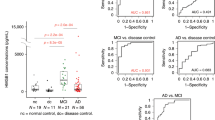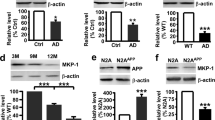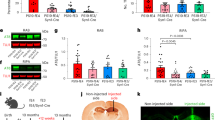Abstract
The multifunctional protein p62 is associated with neuropathological inclusions in several neurodegenerative disorders, including frontotemporal lobar degeneration, amyotrophic lateral sclerosis and Alzheimer’s disease (AD). Strong evidence shows that in AD, p62 immunoreactivity is associated with neurofibrillary tangles and is involved in tau degradation. However, it remains to be determined whether p62 also plays a role in regulating amyloid-β (Aβ) aggregation and degradation. Using a gene therapy approach, here we show that increasing brain p62 expression rescues cognitive deficits in APP/PS1 mice, a widely used animal model of AD. The cognitive improvement was associated with a decrease in Aβ levels and plaque load. Using complementary genetic and pharmacologic approaches, we found that the p62-mediated changes in Aβ were due to an increase in autophagy. To this end, we showed that removing the LC3-interacting region of p62, which facilitates p62-mediated selective autophagy, or blocking autophagy with a pharmacological inhibitor, was sufficient to prevent the decrease in Aβ. Overall, we believe these data provide the first direct in vivo evidence showing that p62 regulates Aβ turnover.
This is a preview of subscription content, access via your institution
Access options
Subscribe to this journal
Receive 12 print issues and online access
$259.00 per year
only $21.58 per issue
Buy this article
- Purchase on Springer Link
- Instant access to full article PDF
Prices may be subject to local taxes which are calculated during checkout





Similar content being viewed by others
Change history
11 August 2020
A Correction to this paper has been published: https://doi.org/10.1038/s41380-020-0854-x
References
Nixon RA . The role of autophagy in neurodegenerative disease. Nat Med 2013; 19: 983–997.
Orr ME, Oddo S . Autophagic/lysosomal dysfunction in Alzheimer's disease. Alzheimers Res Ther 2013; 5: 53.
Yang DS, Stavrides P, Saito M, Kumar A, Rodriguez-Navarro JA, Pawlik M et al. Defective macroautophagic turnover of brain lipids in the TgCRND8 Alzheimer mouse model: prevention by correcting lysosomal proteolytic deficits. Brain 2014; 137 (Pt 12): 3300–3318.
Yang DS, Stavrides P, Mohan PS, Kaushik S, Kumar A, Ohno M et al. Reversal of autophagy dysfunction in the TgCRND8 mouse model of Alzheimer's disease ameliorates amyloid pathologies and memory deficits. Brain 2011; 134 (Pt 1): 258–277.
Caccamo A, Majumder S, Richardson A, Strong R, Oddo S . Molecular interplay between mammalian target of rapamycin (mTOR), amyloid-beta, and Tau: effects on cognitive impairments. J Biol Chem 2010; 285: 13107–13120.
Majumder S, Richardson A, Strong R, Oddo S . Inducing autophagy by rapamycin before, but not after, the formation of plaques and tangles ameliorates cognitive deficits. PLoS One 2011; 6: e25416.
Keck S, Nitsch R, Grune T, Ullrich O . Proteasome inhibition by paired helical filament-tau in brains of patients with Alzheimer's disease. J Neurochem 2003; 85: 115–122.
Keller JN, Hanni KB, Markesbery WR . Impaired proteasome function in Alzheimer's disease. J Neurochem 2000; 75: 436–439.
Gadhave K, Bolshette N, Ahire A, Pardeshi R, Thakur K, Trandafir C et al. The ubiquitin proteasomal system: a potential target for the management of Alzheimer's disease. J Cell Mol Med 2016; 20: 1392–1407.
Tramutola A, Di Domenico F, Barone E, Perluigi M, Butterfield DA . It is all about (U)biquitin: role of altered ubiquitin-proteasome system and UCHL1 in Alzheimer Disease. Oxid Med Cell Longev 2016; 2016: 2756068.
Oddo S . The ubiquitin-proteasome system in Alzheimer's disease. J Cell Mol Med 2008; 12: 363–373.
Mizushima N, Noda T, Yoshimori T, Tanaka Y, Ishii T, George MD et al. A protein conjugation system essential for autophagy. Nature 1998; 395: 395–398.
Jung CH, Jun CB, Ro SH, Kim YM, Otto NM, Cao J et al. ULK-Atg13-FIP200 complexes mediate mTOR signaling to the autophagy machinery. Mol Biol Cell 2009; 20: 1992–2003.
Kabeya Y, Mizushima N, Ueno T, Yamamoto A, Kirisako T, Noda T et al. LC3, a mammalian homologue of yeast Apg8p, is localized in autophagosome membranes after processing. EMBO J 2000; 19: 5720–5728.
Sarkar S, Ravikumar B, Floto RA, Rubinsztein DC . Rapamycin and mTOR-independent autophagy inducers ameliorate toxicity of polyglutamine-expanded huntingtin and related proteinopathies. Cell Death Differ 2009; 16: 46–56.
Salminen A, Kaarniranta K, Haapasalo A, Hiltunen M, Soininen H, Alafuzoff I . Emerging role of p62/sequestosome-1 in the pathogenesis of Alzheimer's disease. Prog Neurobiol 2012; 96: 87–95.
Su H, Wang X . p62 stages an interplay between the ubiquitin-proteasome system and autophagy in the heart of defense against proteotoxic stress. Trends Cardiovasc Med 2011; 21: 224–228.
Ramesh Babu J, Lamar Seibenhener M, Peng J, Strom AL, Kemppainen R, Cox N et al. Genetic inactivation of p62 leads to accumulation of hyperphosphorylated tau and neurodegeneration. J Neurochem 2008; 106: 107–120.
Kuusisto E, Salminen A, Alafuzoff I . Early accumulation of p62 in neurofibrillary tangles in Alzheimer's disease: possible role in tangle formation. Neuropathol Appl Neurobiol 2002; 28: 228–237.
Du Y, Wooten MC, Gearing M, Wooten MW . Age-associated oxidative damage to the p62 promoter: implications for Alzheimer disease. Free Radic Biol Med 2009; 46: 492–501.
Seibenhener ML, Babu JR, Geetha T, Wong HC, Krishna NR, Wooten MW . Sequestosome 1/p62 is a polyubiquitin chain binding protein involved in ubiquitin proteasome degradation. Mol Cell Biol 2004; 24: 8055–8068.
Babu JR, Geetha T, Wooten MW . Sequestosome 1/p62 shuttles polyubiquitinated tau for proteasomal degradation. J Neurochem 2005; 94: 192–203.
Ichimura Y, Kumanomidou T, Sou YS, Mizushima T, Ezaki J, Ueno T et al. Structural basis for sorting mechanism of p62 in selective autophagy. J Biol Chem 2008; 283: 22847–22857.
Johansen T, Lamark T . Selective autophagy mediated by autophagic adapter proteins. Autophagy 2011; 7: 279–296.
Jankowsky JL, Fadale DJ, Anderson J, Xu GM, Gonzales V, Jenkins NA et al. Mutant presenilins specifically elevate the levels of the 42 residue beta-amyloid peptide in vivo: evidence for augmentation of a 42-specific gamma secretase. Hum Mol Genet 2004; 13: 159–170.
Branca C, Wisely EV, Hartman LK, Caccamo A, Oddo S . Administration of a selective beta2 adrenergic receptor antagonist exacerbates neuropathology and cognitive deficits in a mouse model of Alzheimer's disease. Neurobiol Aging 2014; 35: 2726–2735.
Tang W, Ehrlich I, Wolff SB, Michalski AM, Wolfl S, Hasan MT et al. Faithful expression of multiple proteins via 2A-peptide self-processing: a versatile and reliable method for manipulating brain circuits. J Neurosci 2009; 29: 8621–8629.
Lippai M, Low P . The role of the selective adaptor p62 and ubiquitin-like proteins in autophagy. Biomed Res Int 2014; 2014: 832704.
Lin X, Li S, Zhao Y, Ma X, Zhang K, He X et al. Interaction domains of p62: a bridge between p62 and selective autophagy. DNA Cell Biol 2013; 32: 220–227.
Duran A, Amanchy R, Linares JF, Joshi J, Abu-Baker S, Porollo A et al. p62 is a key regulator of nutrient sensing in the mTORC1 pathway. Mol Cell 2011; 44: 134–146.
Caccamo A, Magri A, Medina DX, Wisely EV, Lopez-Aranda MF, Silva AJ et al. mTOR regulates tau phosphorylation and degradation: implications for Alzheimer's disease and other tauopathies. Aging Cell 2013; 12: 370–380.
Caccamo A, De Pinto V, Messina A, Branca C, Oddo S . Genetic reduction of mammalian target of rapamycin ameliorates Alzheimer's disease-like cognitive and pathological deficits by restoring hippocampal gene expression signature. J Neurosci 2014; 34: 7988–7998.
Caccamo A, Branca C, Talboom JS, Shaw DM, Turner D, Ma L et al. Reducing ribosomal protein S6 kinase 1 expression improves spatial memory and synaptic plasticity in a mouse model of Alzheimer's Disease. J Neurosci 2015; 35: 14042–14056.
Oddo S . The role of mTOR signaling in Alzheimer disease. Front Biosci (Schol Ed) 2012; 4: 941–952.
Cai Z, Chen G, He W, Xiao M, Yan LJ . Activation of mTOR: a culprit of Alzheimer's disease? Neuropsychiatr Dis Treat 2015; 11: 1015–1030.
Wang C, Yu JT, Miao D, Wu ZC, Tan MS, Tan L . Targeting the mTOR signaling network for Alzheimer's disease therapy. Mol Neurobiol 2014; 49: 120–135.
Gal J, Strom AL, Kwinter DM, Kilty R, Zhang J, Shi P et al. Sequestosome 1/p62 links familial ALS mutant SOD1 to LC3 via an ubiquitin-independent mechanism. J Neurochem 2009; 111: 1062–1073.
Zhang YB, Gong JL, Xing TY, Zheng SP, Ding W . Autophagy protein p62/SQSTM1 is involved in HAMLET-induced cell death by modulating apotosis in U87MG cells. Cell Death Dis 2013; 4: e550.
Koo EH, Squazzo SL . Evidence that production and release of amyloid beta-protein involves the endocytic pathway. J Biol Chem 1994; 269: 17386–17389.
Welzel AT, Maggio JE, Shankar GM, Walker DE, Ostaszewski BL, Li S et al. Secreted amyloid beta-proteins in a cell culture model include N-terminally extended peptides that impair synaptic plasticity. Biochemistry 2014; 53: 3908–3921.
Zatloukal K, Stumptner C, Fuchsbichler A, Heid H, Schnoelzer M, Kenner L et al. p62 is a common component of cytoplasmic inclusions in protein aggregation diseases. Am J Pathol 2002; 160: 255–263.
Kuusisto E, Salminen A, Alafuzoff I . Ubiquitin-binding protein p62 is present in neuronal and glial inclusions in human tauopathies and synucleinopathies. Neuroreport 2001; 12: 2085–2090.
Du Y, Wooten MC, Wooten MW . Oxidative damage to the promoter region of SQSTM1/p62 is common to neurodegenerative disease. Neurobiol Dis 2009; 35: 302–310.
Perez SE, He B, Nadeem M, Wuu J, Ginsberg SD, Ikonomovic MD et al. Hippocampal endosomal, lysosomal, and autophagic dysregulation in mild cognitive impairment: correlation with abeta and tau pathology. J Neuropathol Exp Neurol 2015; 74: 345–358.
Yu WH, Cuervo AM, Kumar A, Peterhoff CM, Schmidt SD, Lee JH et al. Macroautophagy—a novel Beta-amyloid peptide-generating pathway activated in Alzheimer's disease. J Cell Biol 2005; 171: 87–98.
Friedman LG, Qureshi YH, Yu WH . Promoting autophagic clearance: viable therapeutic targets in Alzheimer's disease. Neurotherapeutics 2015; 12: 94–108.
Spilman P, Podlutskaya N, Hart MJ, Debnath J, Gorostiza O, Bredesen D et al. Inhibition of mTOR by rapamycin abolishes cognitive deficits and reduces amyloid-beta levels in a mouse model of Alzheimer's disease. PLoS One 2010; 5: e9979.
Steele JW, Lachenmayer ML, Ju S, Stock A, Liken J, Kim SH et al. Latrepirdine improves cognition and arrests progression of neuropathology in an Alzheimer's mouse model. Mol Psychiatry 2013; 18: 889–897.
Acknowledgements
We thank Dr Zhu, University of Kentucky, for donating the p62ΔLIR plasmid and Dr Wei Ding, Capital Medical University, China, for donating the wild-type and p62ΔUBA plasmids. This work was supported by grants from the Arizona Alzheimer’s Consortium and the National Institutes of Health (R01 AG037637) to SO.
Author contributions
AC designed and performed the experiments and analyzed the data. EF performed the in vitro experiments and edited the manuscript. CB performed the proteasome experiments and edited the manuscript. SO designed the experiments, analyzed the data and wrote the manuscript.
Author information
Authors and Affiliations
Corresponding author
Ethics declarations
Competing interests
The authors declare no conflict of interest.
Additional information
Supplementary Information accompanies the paper on the Molecular Psychiatry website
Supplementary information
About this article
Cite this article
Caccamo, A., Ferreira, E., Branca, C. et al. RETRACTED ARTICLE: p62 improves AD-like pathology by increasing autophagy. Mol Psychiatry 22, 865–873 (2017). https://doi.org/10.1038/mp.2016.139
Received:
Revised:
Accepted:
Published:
Issue Date:
DOI: https://doi.org/10.1038/mp.2016.139
This article is cited by
-
Autophagy markers, cognitive deficits and depressive symptoms in Parkinson’s disease
Journal of Neural Transmission (2024)
-
Ethanol extract of Andrographis paniculata alleviates aluminum-induced neurotoxicity and cognitive impairment through regulating the p62-keap1-Nrf2 pathway
BMC Complementary Medicine and Therapies (2023)
-
mTOR-dependent TFEB activation and TFEB overexpression enhance autophagy-lysosome pathway and ameliorate Alzheimer's disease-like pathology in diabetic encephalopathy
Cell Communication and Signaling (2023)
-
Amyloid-β impairs mitochondrial dynamics and autophagy in Alzheimer’s disease experimental models
Scientific Reports (2022)
-
Retraction Note: p62 improves AD-like pathology by increasing autophagy
Molecular Psychiatry (2021)



